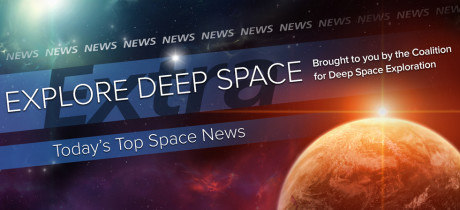In Today’s Deep Space Extra… Lockheed Martin outlines a three-year mission that could have astronauts living and working in orbit around Mars in just over a decade.
Human Deep Space Exploration
Lockheed Martin says Mars Base Camp possible by 2028
Florida Today (3/14): The Lockheed Martin concept would perch Orion capsules at either end of an in-space habitat interconnected to lab modules. This spacecraft would serve as home to a half-dozen astronauts launched as soon as 2028 on a three-year round trip to the red planet. Once in orbit around Mars, those astronauts could control rovers and drones on the Martian surface or in the Martian atmosphere, or board their Orion capsules to explore the Martian moons Phobos and Deimos. “All that we have to do is decide that we’re going to go collectively, together government, industry, international participation. This is a mission for citizens of Earth, and there’s a role for everyone to play,” Tony Antonelli, a former NASA astronaut now employed by Lockheed Martin, explained in an appearance Tuesday before the National Space Club’s Florida Committee, whose members were gathered at the Kennedy Space Center.
Building a Mars colony? You’ll need a team of astronaut ‘MacGyvers’
Space.com (3/14): A successful effort to reach Mars with humans will require billions invested in research, new spacecraft and propulsion systems. When they reach their distant destination, however, the first human explorers will face major challenges likely requiring a wide range of problem solving skills. The scenario was discussed by experts at the MIT hosted, New Space Age Conference last weekend.
The Hill (3/14): Widely recognized as a world leader in the exploration of space, the U.S. is nonetheless vulnerable because of its successes to nations like China and Russia, writes Scott Pace, director of the Space Policy Institute at George Washington University and a former White House and NASA policy adviser. “Space is no longer a sanctuary, if it ever was, and potential adversaries look to space as a key U.S. vulnerability,” he notes.
Buzz Aldrin really, really wants humans to go to Mars
USA Today (3/14): Apollo 11’s Buzz Aldrin, one of only 12 humans who’ve walked on the moon, outlined his vision of a Mars settlement at the annual South by Southwest gathering in Austin, Texas, this week. “I don’t want to be remembered for just kicking moon dust,” said Aldrin, whose proposals would lead to a 150-person red planet settlement, with the first of them launching in the next decade.
Russia starts recruiting team of cosmonauts for flights to moon
Sputnik International (3/14): Officials of Roscosmos, the Russian federal space agency, announced Tuesday the year-long recruitment of up to eight cosmonauts to train for the new Federatsiya spacecraft, a vessel intended to enable human lunar exploration.
Space Science
Mission to Venus: NASA and Russia may explore hellish planet together
Space.com (3/14): Scientists from NASA are meeting with Russian space experts this week to discuss a possible joint robotic mission to Venus, a planet structured much like the Earth that turned quite torrid — hot enough at the surface to melt lead. The discussions include the possibility of an orbiter, a short-lived lander and perhaps an atmospheric balloon equipped with the instrumentation to help explain how the atmospheres of the Earth and Venus went their separate ways. A launch in the 2020s is envisioned for the Russian-led project.
Low Earth Orbit
French astronaut enjoys sax in space
Geekwire (3/14): European Space Agency astronaut Thomas Pesquet celebrated his 39th birthday on February 27 with a special gift, a saxophone, delivered aboard the latest NASA contracted SpaceX Dragon re-supply mission. The instrument came from NASA astronaut Jack Fischer, who is to launch to the Station next month with a Russian colleague. Canadian astronaut Chris Hadfield and American astronaut Cady Coleman famously played guitar and flute aboard the Station. The late shuttle astronaut Ron McNair carried his saxophone along during a 1984 shuttle mission.
Commercial to Low Earth Orbit
Should commercial space activities be permissionless?
Spacepolicyonline.com (3/14): The U.S. House Space Subcommittee explored the issue of how closely the federal government is obligated to regulate space activities during a March 8 Washington hearing. Oversight under the 50-year-old Outer Space Treaty should be as minimal as possible in order to encourage private sector exploration, according to expert testimony. Currently, the Office of Commercial Space Transportation, part of the Department of Transportation and FAA, licenses U.S. launches and re-entries.
Zero 2 Infinity conducts first flight test of Bloostar balloon-assisted launcher
Space News (3/14): Zero 2, of Spain, has tested a high-altitude balloon-assisted launch vehicle for small satellites.

